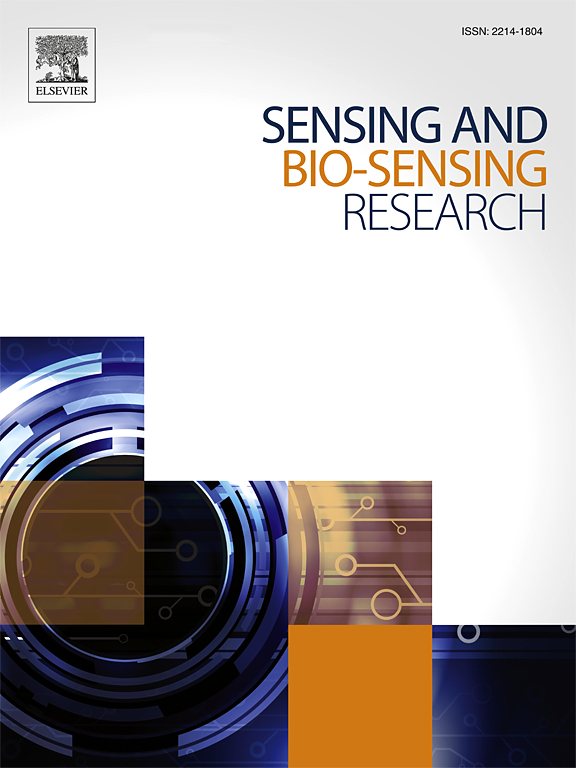A one-pot, one-step CRISPR-AapCas12b-based platform for sensitive and specific detection of Klebsiella pneumoniae
IF 4.9
Q1 CHEMISTRY, ANALYTICAL
引用次数: 0
Abstract
Klebsiella pneumoniae (K. pneumoniae) was a prevalent nosocomial pathogen and a major cause of neonatal sepsis, highlighting the critical need for simple, rapid, sensitive and reliable diagnosis for K. pneumoniae infection. While CRISPR-based diagnostics provide a transformative technology to nucleic acid detection, current CRISPR-based methods often rely on PAM-dependent sequences, involve multiple steps, and are hampered by cumbersome manual operation, sequence limitations and the risk of aerosol contamination. To address these challenges, we developed a novel one-pot, one-step, PAM-independent CRISPR-Cas12b-based detection platform for rapid, sensitive and specific detection of K. pneumoniae, termed CRISPR-KP. This assay integrates multiple cross displacement amplification (MCDA) with CRISPR-Cas12b system in a single reaction mixture, employing MCDA for target nucleic acid amplification and the trans-cleavage activity of CRISPR-Cas12b system for amplification signal decoding. This one-pot assay achieves a remarkable limit of detection 10 fg (∼1.6 copies) of K. pneumoniae DNA within a 40-min isothermal reaction at 59 °C, eliminating the need for complex multi-step procedures. CRISPR-KP demonstrated comparable diagnostic efficiency to the clinical standard method in bronchoalveolar lavage fluid (BALF) samples, with reduced turnaround time and minimal manual operation, highlighting the excellent reliability and accuracy of our assay. Taken together, the CRISPR-KP assay offers a promising diagnostic tool for K. pneumoniae detection in centralized laboratories, point-of-care settings, and primary healthcare institutions.
基于crispr - aapcas12b的一锅一步灵敏特异性检测肺炎克雷伯菌平台
肺炎克雷伯菌(克雷伯菌)是一种流行的医院病原菌,也是新生儿败血症的主要原因,因此迫切需要对肺炎克雷伯菌感染进行简单、快速、敏感和可靠的诊断。虽然基于crispr的诊断为核酸检测提供了一种变革性技术,但目前基于crispr的方法通常依赖于pam依赖的序列,涉及多个步骤,并且受到繁琐的手动操作、序列限制和气溶胶污染风险的阻碍。为了解决这些挑战,我们开发了一种新的一锅,一步,pam不依赖crispr - cas12b的检测平台,用于快速,敏感和特异性检测肺炎克雷伯菌,称为CRISPR-KP。本实验将多重交叉位移扩增(multiple cross displacement amplification, MCDA)与CRISPR-Cas12b系统整合在一个反应混合物中,利用MCDA进行靶核酸扩增,利用CRISPR-Cas12b系统的反式裂解活性进行扩增信号解码。这种单锅法在59°C的40分钟等温反应中达到了10 fg(~ 1.6拷贝)肺炎克雷伯菌DNA的显著检出限,无需复杂的多步骤程序。CRISPR-KP在支气管肺泡灌洗液(BALF)样本中显示出与临床标准方法相当的诊断效率,缩短了周转时间和最少的人工操作,突出了我们的检测方法的出色可靠性和准确性。综上所述,CRISPR-KP检测为集中实验室、护理点环境和初级卫生保健机构的肺炎克雷伯菌检测提供了一种有前景的诊断工具。
本文章由计算机程序翻译,如有差异,请以英文原文为准。
求助全文
约1分钟内获得全文
求助全文
来源期刊

Sensing and Bio-Sensing Research
Engineering-Electrical and Electronic Engineering
CiteScore
10.70
自引率
3.80%
发文量
68
审稿时长
87 days
期刊介绍:
Sensing and Bio-Sensing Research is an open access journal dedicated to the research, design, development, and application of bio-sensing and sensing technologies. The editors will accept research papers, reviews, field trials, and validation studies that are of significant relevance. These submissions should describe new concepts, enhance understanding of the field, or offer insights into the practical application, manufacturing, and commercialization of bio-sensing and sensing technologies.
The journal covers a wide range of topics, including sensing principles and mechanisms, new materials development for transducers and recognition components, fabrication technology, and various types of sensors such as optical, electrochemical, mass-sensitive, gas, biosensors, and more. It also includes environmental, process control, and biomedical applications, signal processing, chemometrics, optoelectronic, mechanical, thermal, and magnetic sensors, as well as interface electronics. Additionally, it covers sensor systems and applications, µTAS (Micro Total Analysis Systems), development of solid-state devices for transducing physical signals, and analytical devices incorporating biological materials.
 求助内容:
求助内容: 应助结果提醒方式:
应助结果提醒方式:


